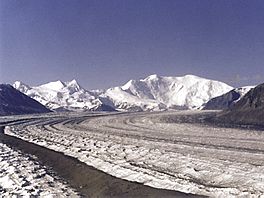Nabesna Glacier facts for kids
Quick facts for kids Nabesna Glacier |
|
|---|---|

The Nabesna Glacier, with Mount Blackburn at right; Atna Peaks is the twin summit left of center
|
|
| Type | Valley glacier |
| Location | Valdez-Cordova Census Area, Alaska, U.S. |
| Coordinates | 61°56′00″N 143°05′26″W / 61.93333°N 143.09056°W |
| Area | ? |
| Length | 53 miles (85 km) |
| Thickness | ? |
| Terminus | Nabesna River |
| Status | ? |
Nabesna Glacier is a huge glacier located in Alaska, a state in the United States. It gets its ice from lots of snowfall in the Wrangell Mountains. This amazing glacier is 53 miles (85 km) long. That makes it the longest valley glacier in all of North America. It's also the longest valley glacier found far away from the coast anywhere in the world!
Contents
About the Glacier
Where the Glacier Begins
The Nabesna Glacier starts from a very large icefield. This icefield covers the northern sides of Mount Wrangell. Mount Wrangell is a huge shield volcano that stands at 14,163 feet (4,317 meters) tall.
The Glacier's Journey
From its start, the glacier first flows east. It passes by other volcanic mountains like Mount Blackburn and Atna Peaks. Then, it turns north. The glacier ends at about 3,000 feet (900 meters) elevation. This end point, called the terminus, is about 15 miles (24 km) south of an old mining town called Nabesna. You can reach this area by following the Nabesna Road.
How the Glacier Grows
The Nabesna Glacier is incredibly wide and long. It gets its ice from about 40 smaller glaciers that join it. These are called tributary glaciers. When the ice at the end of the glacier melts, it forms the Nabesna River. This river flows north through the Tetlin National Wildlife Refuge and then into the Tanana River.
History and Exploration
Naming the Glacier
The glacier was named after the Nabesna River in 1902. A person named F. C. Schrader from the U.S. Geological Survey gave it this name.
Visiting the Glacier
The Nabesna Glacier is the main way to get into the middle of the eastern Wrangell Mountains. It's a popular spot for ski mountaineers, climbers, and scientists. Special bush planes with skis can land on the glacier. They usually land between 6,000 and 7,000 feet (1,800-2,100 meters) high. This is possible when the ice and deep cracks, called crevasses, are covered by winter snow.
Changes Over Time
How the Glacier is Shrinking
The Nabesna Glacier has been slowly getting smaller since at least the early 1900s. This shrinking is called a retreat. There is also evidence that the glacier might have been retreating for even longer. Scientists have found glacial deposits much farther down the valley. These deposits suggest that the glacier might have once been over 200 miles long!
 | Valerie Thomas |
 | Frederick McKinley Jones |
 | George Edward Alcorn Jr. |
 | Thomas Mensah |

